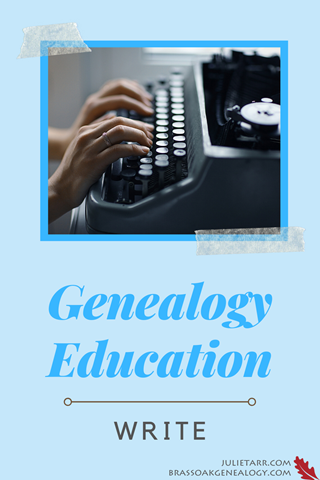Education is important for genealogists to undertake. With a vast array of records that we consult to the techniques that we use to solve tough problems, it’s vital that we stay in the know and continually learn. This is a topic that I am passionate about. Had I not taken steps to educate myself from the beginning of my journey, I would not be where I am today with a nicely defined (although still in progress) pedigree and the ability to help others trace their roots.
This is the sixth and final in a series of posts about genealogy education.
Now, you might be thinking, what on earth does she mean by writing as a means of education? Well, I have found that writing, in any form for genealogy, helps me learn. Here are a few examples.
When you write an informational or instructional article, whether for your blog or a society publication, the process of writing that article helps you learn because you usually study the subject in-depth to present the best information for your audience. So, if you want to learn more and dig deeper into a subject, why not write about it at the same time, which will force you to investigate and in turn learn more about the topic (and get published!).
Another example is writing case studies and narratives for genealogical publications. Many of these types of articles are typically peer-reviewed, which means that someone (or several someones) is evaluating the submission for completeness, logic, and sound research. You will learn so much going through this process. Sometimes, you might get feedback suggesting that other sources need to be consulted, or that a conclusion is based on weak evidence. While it’s frustrating to get that feedback, keep in mind that it is meant to be constructive and help you be the best researcher you can be. And while you’re fixing up that submission based on the feedback, you continue to learn and grow—it’s a win-win!



Share your thoughts...